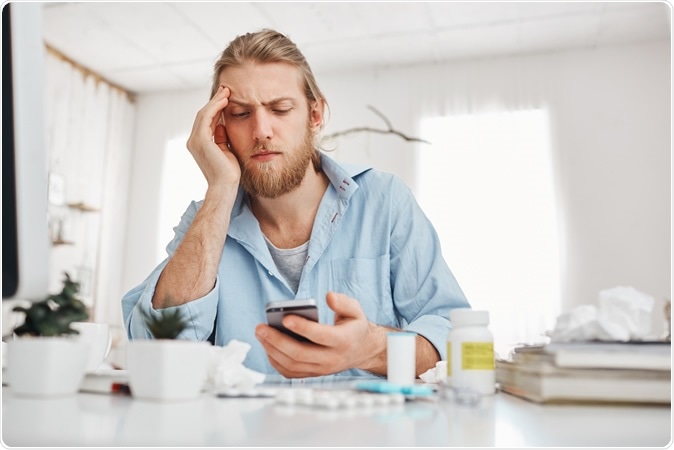A new study published in the March 2020 issue of the journal Neurology Clinical Practice reports that smartphone use by people who have headaches is associated with greater use of medication but less relief, compared to those who do not use smartphones when they have headaches. This does not prove that smartphone use is responsible for the increased need for drugs or the relative intractability of the headaches, but shows a linkage.

Image Credit: Cookie Studio / Shutterstock
The researcher, Deepti Vibha, says, “While these results need to be confirmed with larger and more rigorous studies, the findings are concerning, as smartphone use is growing rapidly and has been linked to a number of symptoms, with headache being the most common.”
An earlier meta-analysis has shown that smartphone use is associated with an increased risk of headaches, as compared with those who do not use the same. Moreover, an increased number of calls and an increased duration of calls per day were linked to a higher risk of a headache. This agrees with the findings of many other studies.
The mechanism of a headache in such subjects has been suggested to be a breakdown of the blood-brain barrier due to the constant impact of low-energy microwaves. Others suggest the involvement of the dopamine-opiate system due to the use of electromagnetic energy. The authors conclude that the use of mobile phones is a risk factor for headache and deserves independent assessment among headache patients, as well as preventive public health education of young people, in particular.
The study
The researchers looked at 400 people in India with primary headaches, including tension headaches and migraines. They asked these individuals about their patterns of smartphone use, their headaches, and their use of medication.
The group comprised about 200 each of smartphone users and non-users. The latter group was likely to be older, less educated, and poorer as well as of a lower social class compared to the first group.
The findings
The individuals who used smartphones were likely to use pain relievers for their headaches, compared to those who did not use smartphones, at 96% vs. 81%, respectively. Moreover, individuals in the first group used eight pills per month, on average, compared to 5 pills in the second group.
The first group also was less likely to experience complete relief, with 84% saying they had complete or moderate pain relief with medication, compared to 94% of non-smartphone users.
However, the frequency, duration, or intensity of headaches did not differ significantly between the users and non-users.
Another neurologist, Heidi Moawad, said in an accompanying editorial, “The root of the problem is not yet clear.” She lists several factors which could be responsible for such headache in such users – the neck position, the phone’s lighting, the eye strain, or the stress of having to be within a range of others all the time, via the phone. These and many more must be studied to help create plans in which the very convenient and versatile devices feature prominently, yet more sustainably.
Says Moawad, “Features such as hands-free settings, voice activation, and audio functions could potentially hold the key to helping smartphone users benefit from their phones without exacerbating their headaches.”
Study limitations include the availability of data relating to smartphone use by people with headaches to one event, rather than following up on those with repeated surveys. Moreover, the groups were quite different in their socioeconomic and demographic data. They also provided all data regarding their use of headache medication and of smartphones, which could have introduced bias due to incorrect or incomplete recall.
Journal reference:
Wang, J., Su, H., Xie, W. et al. Mobile Phone Use and The Risk of Headache: A Systematic Review and Meta-analysis of Cross-sectional Studies. Sci Rep 7, 12595 (2017). https://doi.org/10.1038/s41598-017-12802-9